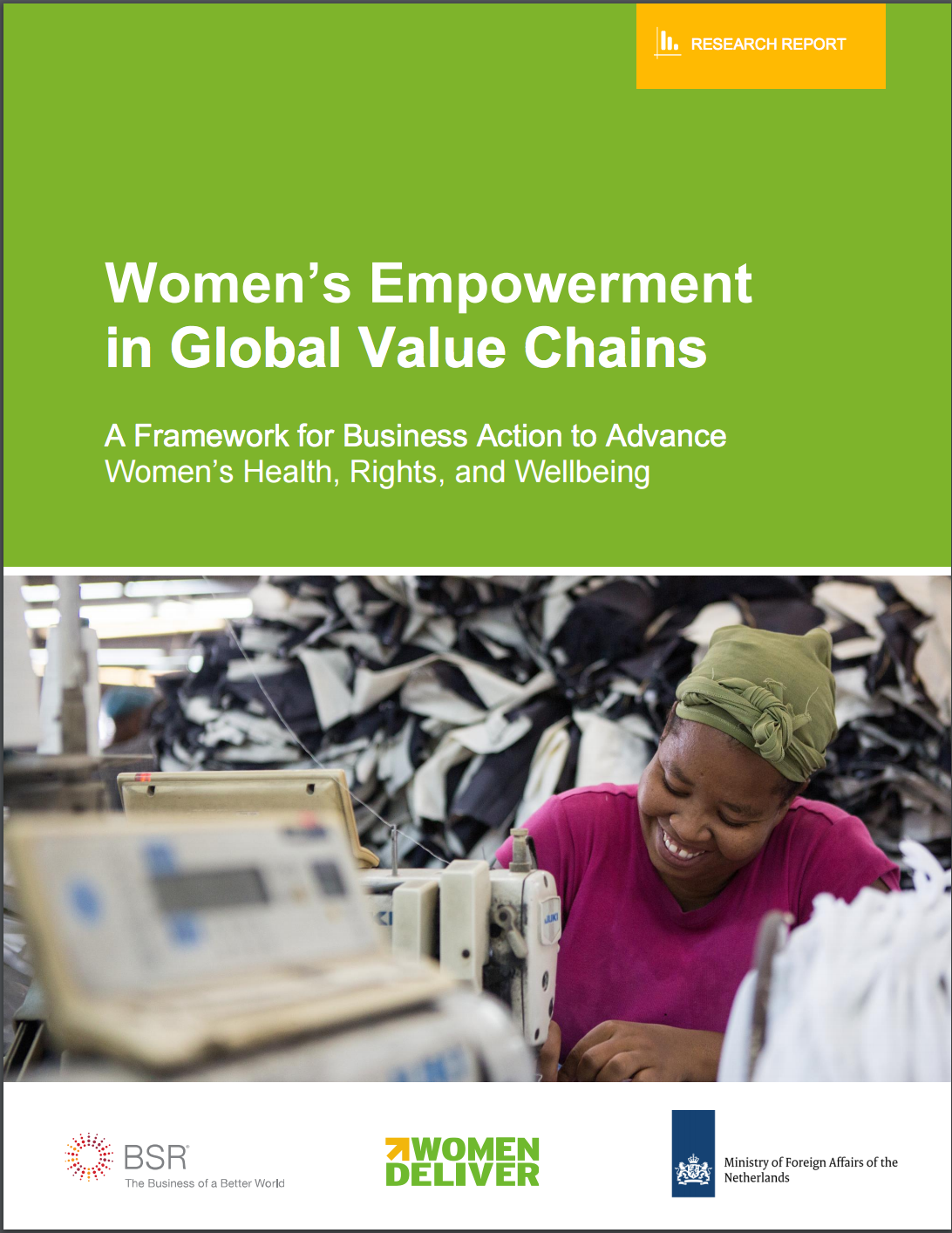New BSR, Women Deliver, Dutch Ministry of Foreign Affairs Report: How Business Can Advance Women’s Health, Rights, and Wellbeing in Global Value Chains

San Francisco, September 19, 2016 /3BL Media/ — In the past several years, there has been a growing business movement to empower women, with individual companies setting internal targets and with commitments enshrined at the global level in the Sustainable Development Goals, the Women’s Empowerment Principles, and the UN HeForShe campaign.
The new report “Women’s Empowerment in Global Value Chains: A Framework for Business Action to Advance Women’s Health, Rights, and Wellbeing”—developed by BSR, Women Deliver, and the Dutch Ministry of Foreign Affairs—translates these ambitious goals into a practical framework companies can use to advance empowerment throughout global value chains—resulting in tangible benefits for business, women, and society.
“This framework anchors women’s empowerment into core company strategy so executives understand the business benefits in terms of cost savings, increased productivity, innovation, and market growth,” said BSR Senior Vice President Peder Michael Pruzan-Jorgensen. “Despite all of the high-level commitments, companies lack practical guidance for women’s empowerment. This report gives functional leaders from product design and raw materials procurement to marketing and sales the tools to integrate women’s empowerment into their roles.”
“It is no longer business as usual,” said Katja Iversen, President and CEO of Women Deliver. “Business leaders around the world are recognizing the virtues and benefits of investing in women’s health, rights, and wellbeing in their value chains. It’s a win-win. With this report, BSR, Women Deliver, and the Dutch Ministry of Foreign Affairs offer tools, case studies, and a roadmap for how businesses can and must do more to empower women in the workforce and beyond.”
The report draws on recent literature on corporate engagement in women’s empowerment and includes examples and insights from companies such as Gap, KappAhl, Kimberly-Clarke, MasterCard, Novo Nordisk, Proctor & Gamble, Royal Dutch Philips, Sodexo, and many others.
The report describes three key principles that ensure business action is:
Holistic: considers the full scope of economic, social, cultural, and political factors that affect women’s access to information, opportunities, and agency.
Integrated: embeds gender considerations throughout company functions, processes, policies, values, and relationships across the value chain.
Strategic: accounts for feasibility, business drivers, and long-term investment, as well as the company’s expertise, resources, tools, and networks.
BSR’s three-part framework helps business executives and functional leaders understand the different opportunities for companies to support women’s empowerment:
- Act: Take action within the company’s direct control by adjusting policies, practices, and investments.
- Enable: Invest in and partner with other businesses, NGOs, and community organizations to help remove barriers women face such as access to healthcare, finance, education, business tools and resources, and legal support.
- Influence: Engage in research, advocacy, and communications to promote gender equality and opportunities for women.
Finally, the report gives companies four concrete steps for taking action:
- Establish the business case: Understand why women’s empowerment is important for the company’s mission, activities, value chain, and stakeholders.
- Set priorities: Prioritize issues based on the company’s greatest potential to affect progress on women’s empowerment. Consider the company’s sector, geographies, and operations.
- Identify opportunities for action: Develop a plan that covers how the company can act, enable, and/or influence.
- Integrate and implement: Create a culture of inclusion, set aspirational goals and realistic targets, establish accountability, and measure and report on outcomes.
The report emphasizes the importance of collaboration and highlights two new initiatives BSR and the Dutch Ministry of Foreign Affairs are developing. The first will drive industrywide change through leading global supply chain code of conduct initiatives, and the second will create a global business network to increase individual businesses’ scale of action throughout their value chains. The global business network will launch at the BSR Conference 2016.
“Women’s empowerment cuts across every part of business because women are present in every part of the global value chain—as producers and business owners, executives and employees, distributors, and consumers,” said Pruzan-Jorgensen. “We hope this framework helps companies understand the multitude of ways business can act, enable, and influence to advance women’s empowerment.”

